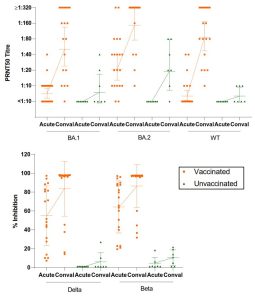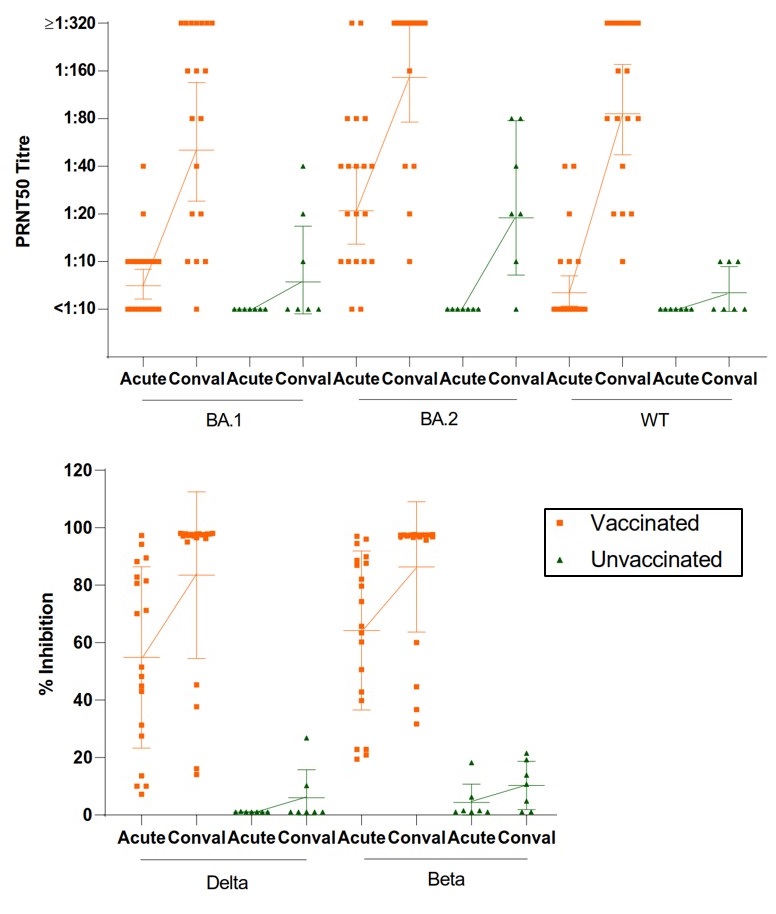CUHK
News Centre
HKUMed-CU Medicine joint study shows that vaccinated individuals develop more robust and broadly reactive antibody responses against SARS-CoV-2 variants than the unvaccinated after an Omicron infection
A recent study jointly conducted by the LKS Faculty of Medicine, The University of Hong Kong (HKUMed) and the Faculty of Medicine, The Chinese University of Hong Kong (CU Medicine) shows that vaccinated individuals can develop more robust and broadly reactive antibody responses against SARS-CoV-2 variants than unvaccinated individuals after an Omicron infection. This highlights the need for COVID-19 vaccination for unvaccinated people even after an SARS-CoV-2 infection. The findings are now published in Eurosurveillance [link to the publication].
Background
Variant of Concern (VOC) Omicron caused the fifth COVID-19 wave in Hong Kong. This virus acquired novel mutations in its spike protein and allowed vaccine breakthrough infection. A research led by Professor Malik Peiris, Tam Wah-Ching Professor in Medical Science and Chair Professor of Virology at the School of Public Health, HKUMed and Professor David Hui Shu-cheong, Stanley Ho Professor of Respiratory Medicine and Chairman of Department of Medicine and Therapeutics, CU Medicine, studied the virus neutralising activity in the blood of vaccinated individuals after an Omicron, BA.1 or BA.2, infection.
Research findings
The findings show that an Omicron infection in unvaccinated people can only induce very weak antibody responses, which react with Omicron only. In contrast, a breakthrough infection caused by Omicron in fully vaccinated individuals leads to a more potent antibody response, which is six times higher than those of unvaccinated COVID-19 patients. More importantly, such an antibody response found in vaccinated individuals is broadly reactive and it can react with other VOCs, such as Beta and Delta.
‘Vaccination can help do more other than preventing severe COVID-19 outcomes. Those who had been fully vaccinated with either BNT162b2 or CoronaVac and then got breakthrough infection have very strong and very broad immunity against many variants including BA.2, BA.1 and others. Thus, for vaccinated individuals, the infection can help to train your body to better prepare for a re-infection caused by another SARS-CoV-2 variants in future,’ remarked Professor Peiris.
‘Do not assume an Omicron infection in unvaccinated individuals alone can induce strong immunity to protect yourself against future variants. Antibody response induced by a natural infection with Omicron in unvaccinated people is weak and not broadly reactive to other VOCs. These patients are highly recommended to get vaccinated after full recovery from infection (at least one month or more after the infection),’ said Professor Hui.
About the research team
The study team included Dr Chris Mok Ka-pun, Miss Chen Chunke, Dr Susanna S Ng, Dr Fanny W Ko, Ms Karen Yiu, and Dr Ken KP Chan at CU Medicine; Dr Bosco Lam Hoi-Shiu at North Lantau Hospital; and Professor Leo Poon Lit-man, Mr Samuel Cheng Mo-sheung, Mr Karl Chan Chak-kai, Mr Leo Luk Long-hei, Mr John Li Ka-chi, Mr Leo Tsang Chi-hang from the School of Public Health, HKUMed.
Acknowledgements
This research was supported by grants from the Health and Medical Research Fund Commissioned Research on the Novel Coronavirus Disease (COVID-19), Food and Health Bureau, the Government of the Hong Kong Special Administrative Region (COVID1903003; COVID190126) (CKPM, DSH and MP), National Institutes of Health in the United States (contract no. U01-Grant AI151810) (MP), National Natural Science Foundation of China (NSFC) / Research Grants Council (RGC) Joint Research Scheme (N_HKU737/18) (CKPM and MP), RGC theme-based research schemes (T11-712/19-N and T11-705/21-N) (LLMP, DSH, MP), Guangdong-Hong Kong-Macau Joint Laboratory of Respiratory Infectious Disease (20191205) (CKMP), Emergency Key Program of Guangzhou Laboratory (Grant No. EKPG22-30-6) (CKPM, MP) and the Centre for Immunology & Infection (C2i) (LLMP, MP) administered by Innovation and Technology Commission of Hong Kong and visiting scientist scheme from Lee Kong Chian School of Medicine, Nanyang Technological University, Singapore (CKPM).

Antibody responses from vaccinated (orange) and unvaccinated (green) individuals after an Omicron BA.2 infection. Acute and convalescent (Conval) serum samples from infected individuals were tested for their neutralising activities against the ancestral SARS-CoV-2 (WT) and its VOCs (Beta, Delta, Omicron BA.1 and Omicron BA.2). Vaccinated and recovered COVID-19 patients are shown to have more robust antibody responses against different SARS-CoV-2 variants.




